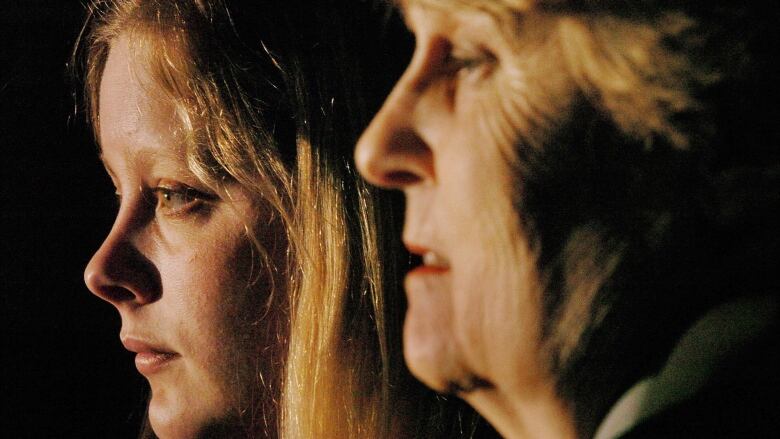Alcohol-related disabilities 'invisible' in Canada, advocates say
Toronto couple behind awareness day say many adults unaware of Fetal Alcohol Spectrum Disorder risks

FASDay,a global awareness day for Fetal Alcohol Spectrum Disorder (FASD), is held on the ninth day of the ninth month for a reason. That's to drive home the point that during the nine months of pregnancy no amount of alcohol is considered medically safe.
"Some people will say: 'Oh, my mother drank so I'm fine.' But we don't know how many IQ points you lost," says Brian Philcox, who organizes the day every year, with his wife Bonnie Buxton. "There's no safe kind [of alcohol], no safe time [to drink alcohol]. When you're planning a pregnancy, that's when you should stop drinking."
In Toronto, the couple's charity, FASworld, is holding a "pregnant pause" to coincide with FASDay on Tuesday.
Demonstrators will meet at the intersection of Yonge Street and Dundas Street wearing balloons under T-shirts promoting alcohol-free pregnancies. Also this year, FASDay partnered with the LCBO to provide FASD information at all 640 liquor store locations from August 25 until September 12.
"FASD is still the most common, the most expensive, and yet the most preventable of all mental disorders in the industrialized world," says Philcox.
Alcohol consumption during pregnancy is responsible for disabilities in one in every 100 Canadians according to Health Canada. Toronto Public Health and other experts in the field say that number could be much higher because so many people with FASD disabilities are never diagnosed.
"This is a largely invisible disease," says Philcox. "A very high population are just classified as slow learners or villains, but these are people with traumatic brain injuries."
Susan Blue is a maternal infant health manager with Toronto Public Health. She says many factors such as genes, a mother's weight and a baby's development all factor into whether a glass of wine or beer will end up causing brain damage in a baby.
"We can't just say...if you have a couple of drinks while you're pregnant, you're going to have this happen or not going to have this happen. It's very individual," she says.
"The bottom-line message that we're really promoting based on lots of literature and lots of research is no amount of alcohol during pregnancy is safe," says Blue.
Bonnie and Brian's story
Philcox and Buxton adopted their now 34-year-old daughter, Colette when she was three years old. They were given no indication their daughter might have a form of FASD. To them, she was simply a "beautiful, healthy toddler." Philcox does not recall the Children's Aid Society mentioning FASD was a risk, although he says he and his wife did know Colette's biological mother had a drinking problem.
Potential consequences of Fetal Alcohol Spectrum Disorder (FASD) include:
- Physical birth defects
- Facial abnormalities
- Learning disabilities
- Memory difficulty
- Having a short attention span
- Difficulty communicating feelings in an appropriate manner
- Difficulty understanding consequences of actions
Source: Toronto Public Health
"Colette began acting out around age 10," says Philcox. "By the time she was 15, she had run away from home several times and was living on the street." She also developed a crack addiction for a period during her teen years.
Buxton remembers crying "every day" during this time.
It was not until Buxton saw a television program in the mid-1990s about Fetal Alcohol Syndrome (FAS) a severe form of FASD that things began to click.
Buxton remembers the segment profiled a handful of men who struggled with FAS. "I immediately recognized (behavioural) traits in those young men that I saw in Colette," she says.
"Colette lacked the ability to write or think clearly in the conventional sense," says Philcox. His daughter also has difficulty recalling memories, trouble completing schoolwork, issues interacting with authority figures and acting impulsively with money.
Many of Colette's problematic behaviour traits were later tied to a medical diagnosis: Alcohol-Related Neurodevelopmental Disorder, a type of FASD.
"We didn't even know such a thing existed, we didn't know alcohol could cause this kind of problem," says Philcox. "She looks as normal as anyone, she's tall and healthy. The deficits are in the brain function."
Buxton says Colette's diagnosis in the late-1990s, allowed her family to make sense of Colette's troubles in school and at home. She says it was a relief for the entire family.
"We knew as parents and Colette knew for herself, that her issues were not our fault and were not her fault," Buxton says.
After the diagnosis, Philcox and Buxton went on to found FASworld to warn of the dangers alcohol poses during pregnancy, but also to support other parents with FASD-affected children.
FASD: a multi-billion dollar problem
According to Toronto Public Health, the cost of supporting Canadians with FASD is approximately $6.2 billion annually.
Blue says that cost includes "the diagnosis but also the social supports and treatment...so if a person ends up in the criminal justice system then there's a cost by having them in jail."
Buxton and Philcox both stress that the campaign is not about "blaming mothers." But about informing men and women, of every age, that consuming alcohol is not safe, in any amount. They want to create a culture shift.
"If we really came to terms with this problem of drinking in pregnancy, then we would cut the number of special ed students in half, cut the number we incarcerate in half. We would generally have a much safer society," Philcox says.












_(720p).jpg)


 OFFICIAL HD MUSIC VIDEO.jpg)
.jpg)



























































































